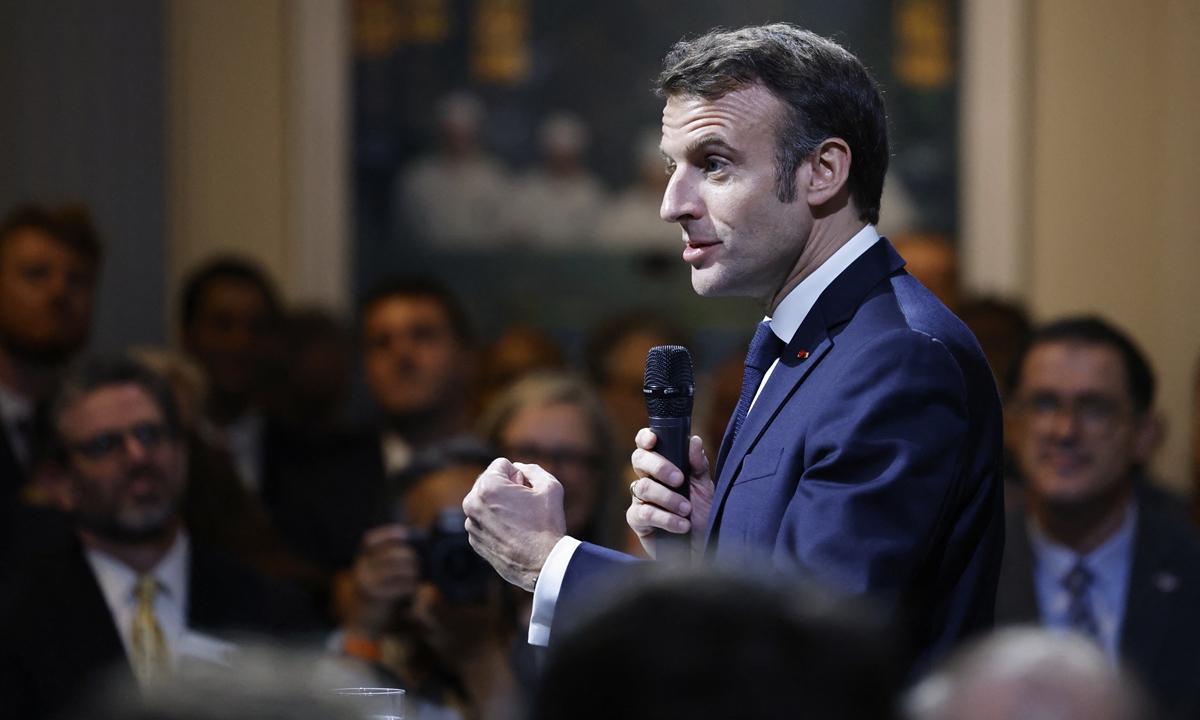
French President Emmanuel Macron Photo:AFP
In an interview with French TV station TF1 recorded during his state visit to the US last week, French President Emmanuel Macron said Europe needs to prepare its future security architecture that should address Russia's need for security guarantees. Ukraine and some Baltic countries voiced strong opposition.
The statement from Macron represents different views in a major Western country toward the prospect of the ongoing Russia-Ukraine conflict. Contrary to the US and Ukraine which want to crush Putin's rein, major Western countries know clearly that Putin's regime can hardly be brought down now and that even if it were brought down, they cannot afford it. Therefore, the security architecture promoted by Macron that seeks co-existence with Russia is a pragmatic concept.
The attitude of Ukraine and Baltic countries toward Russia is still tough, but the shift in attitude of major Western European countries is the result of their realization of their losses in the conflict and the reality that long-term support to Ukraine cannot be sustained.
The US-built Cold War-style security architecture Europe relied on is on the brink of collapse. The one Macron referred to is completely different from the previous one. The security architecture Macron is eyeing for can be inclusive and stresses mutual security and common security. But the Cold War-style security architecture is led by NATO with the mission of strategically squeezing the space of non-NATO countries. Such an exclusive structure is bound to create conflicts. NATO did not bring much sense of security to Europe, but instead used provocation to squeeze Russia's strategic space that prompted Russia and fight back.
It would be good for Europe if a security architecture that stresses co-existence can be established. Europe cannot go back to what it was before the Russia-Ukraine conflict. If Europe follows the US security architecture, Europe will only end up being dragged into a protracted conflict and lingering on its last breath. This will harm both Europe and Russia. But if an architect can guarantee the security of both, they can stop the bleeding.
Whether such a security architecture can actually be realized remains in doubt. Major Western European countries have almost lost their diplomatic independence amid the conflict and it remains to be seen if they can still stand straight. If major countries such as Germany and France continue to obey and be subject to US policy toward Russia like they did at the beginning of the Ukraine war, such a security architecture will not be established. Europe as a whole must be able to show its independence and have the courage and determination to play the role as a polar in the world. Only when Europe truly becomes a pole of the world, can its proposed security architecture be accepted by all sides. If Europe cannot prove its diplomatic ability and strategic autonomy, no one will follow its proposed concept.
The US and major European countries are experiencing growing rifts. They have fundamentally different interests in dealing with Russia. For the US, squeezing out Russia and bringing down Putin's regime fits US interests, even it means the US has to pay heavy costs. But when Germany and France evaluate their gains and losses 10 months into the Ukraine war, they that all they have got is are losses. From a short-term perspective, they have to pay more for energy, while in the long run, they face a declining status on the world stage.
Germany and France have changed their tone on the Russia-Ukraine conflict. In June, Macron said it is vital that Russia is not humiliated so that when the fighting stops in Ukraine a diplomatic solution can be found. In October, Marcon said that Paris would not trigger a nuclear response if Russia launched such a strike "in Ukraine or in the region."
In terms of Germany's role, an analysis from the Council on Foreign Relations, a US think tank, pointed to Germany's lack of leadership in Europe to provide military assistance to Ukraine. The security architect raised by Macron now is a sign of major European countries' shift of attitude and an inevitable result as the Ukraine crisis comes to what it is now.
The author is an assistant research fellow from the Center for Russian Studies of East China Normal University. opinion@globaltimes.com.cn




